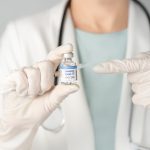NEW STUDY: mRNA COVID shots increase risk of symptomatic SARS-CoV-2 infection
 (NaturalHealth365) Nearly a year ago, the director of the U.S. Centers for Disease Control and Prevention (CDC), Dr. Rochelle Walensky, said in an interview on CNN that the COVID shots “continue to work … with regard to severe illness and death – they prevent it. But what they can’t do anymore is prevent transmission.” The jaw-dropping admission (are we seriously being groomed to believe that it’s okay if vaxxes can’t prevent transmission?) was swiftly fact-checked and labeled as “missing context” by mainstream media as the push to continue positioning COVID jabs as one of the best ways out of the pandemic remained strong.
(NaturalHealth365) Nearly a year ago, the director of the U.S. Centers for Disease Control and Prevention (CDC), Dr. Rochelle Walensky, said in an interview on CNN that the COVID shots “continue to work … with regard to severe illness and death – they prevent it. But what they can’t do anymore is prevent transmission.” The jaw-dropping admission (are we seriously being groomed to believe that it’s okay if vaxxes can’t prevent transmission?) was swiftly fact-checked and labeled as “missing context” by mainstream media as the push to continue positioning COVID jabs as one of the best ways out of the pandemic remained strong.
Yet a new study published this month in the prestigious New England Journal of Medicine (NEJM) further complicates the narrative for pro-vaxxers, as it suggests that people who have received these mRNA injections may be more likely to experience a SARS-CoV-2 infection and suffer.
NEJM study suggests that COVID jabs may increase risk of SARS-CoV-2 infection, at least at certain point in time post-doses
The study, “Effects of Previous Infection and Vaccination on Symptomatic Omicron Infections,” analyzed data from 100,000 SARS-CoV-2 (allegedly Omicron subvariants) infected individuals and non-infected individuals from the Middle Eastern country Qatar between December 23, 2021, and February 21, 2022.
The study’s objective was to evaluate the overall effectiveness of the mRNA COVID jabs (BNT162b2 from Pfizer-BioNTech and mRNA-1273 from Moderna) vs. natural immunity vs previous infection plus vaccination against symptomatic and/or severe COVID-19 disease.
Chief among their findings:
Natural immunity works (and, we can surmise, certainly shouldn’t be banned as a discussion point on social media). “Previous infection with a variant other than Omicron was associated with an approximately 50% reduced risk of infection,” the authors discuss.
In their analysis, the authors also found that two doses of the mRNA jabs given to previously uninfected individuals “had negligible effectiveness” against circulating SARS-CoV-2 Omicron subvariants, a finding “explained by the short-lived protection of primary-series vaccination against omicron infections and the more durable protection from natural infection” (emphasis ours).
The effectiveness of the gene-therapy jabs might be worse than “negligible,” however.
Figure 3 from the study suggests that six months after the second Pfizer and Moderna doses, the efficacy of the jabs actually dropped to -3.4 percent and -10.3 percent, respectively. Such negative efficacy suggests that at this point in time, people were more likely to become infected with SARS-CoV-2 compared to someone with no prior history of infection and vaccination.
The authors also say their analysis “showed rapidly waning vaccine protection after the second and third doses but slowly waning protection from previous infection.” (Such findings are similar to findings of yet another study published a week earlier in NEJM.)
So, what about the argument from the CDC and MD influencers insisting that even if you’ve had COVID-19, you should still get vaxxed?
Is getting vaxxed even after you’ve had and recovered from COVID-19 worth it, according to science?
According to these researchers, “protection conferred by hybrid immunity of previous infection and two-dose vaccination was similar to that of previous infection alone, at approximately 50%, which suggests that this protection originated from the previous infection and not from vaccination” (emphasis ours).
In other words, two shots of the mRNA tech may not provide any added benefit in terms of “protection” if you’ve already recovered from COVID-19 … which begs the question: why bother assuming all the known and unknown risks of the shot if it won’t do you any added good – and especially if the CDC admits it won’t stop transmission?
The study still seems to paint vaxxes in a positive or at least neutral light. The authors still concluded that “[v]accination enhanced protection among persons who had had a previous infection” (which says nothing of how “good” the enhanced protection is, just that it’s “enhanced”) and that “previous infection and recent booster vaccination conferred the strongest protection” … “recent” being the operative word here, of course. After all: how soon do those benefits drop away as you get further and further out from the third dose?
Additional statements from the study – such as “Previous infection alone, [Pfizer] vaccination alone, and [prior infection plus vaccination] all showed strong effectiveness (>70%) against severe, critical, or fatal COVID-19 due to [the Omicron variant]” and “No discernable differences in protection against symptomatic [Omicron subvariant] infection were seen with previous infection, vaccination, and hybrid immunity” – have been criticized by Dr. Madhava Setty, board-certified anesthesiologist and senior science editor for The Defender, as being ambiguous or based on data that lacks statistical significance.
The bottom line: again and again, we see that natural immunity is effective. However, data supporting the long-term effectiveness of the shots at preventing symptomatic COVID-19 is less clear, and growing evidence even indicates that at a certain point, previous doses of the mRNA jabs may actually make a person more susceptible to illness compared to no jabs at all.
Sources for this article include:
Childrenshealthdefense.org
NEJM.org
NEJM.org
CDC.gov
USAtoday.com



